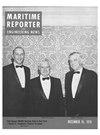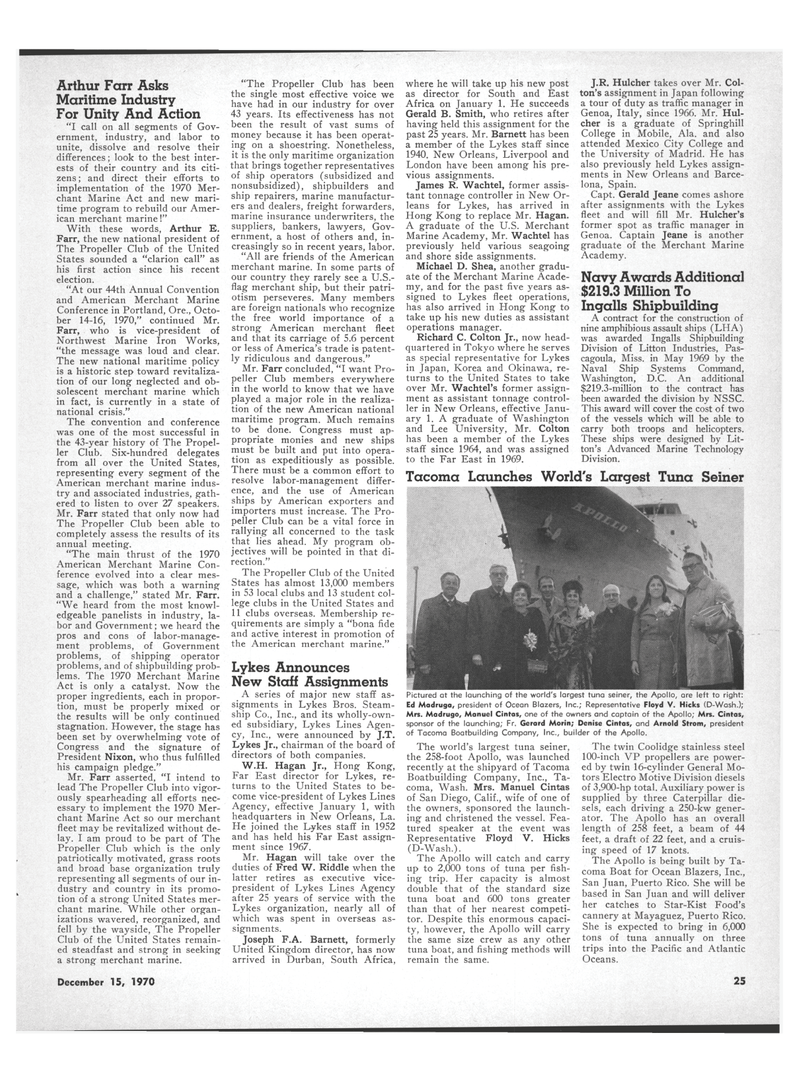
Page 23: of Maritime Reporter Magazine (December 15, 1970)
Read this page in Pdf, Flash or Html5 edition of December 15, 1970 Maritime Reporter Magazine
Arthur Farr Asks
Maritime Industry
For Unity And Action "I call on all segments of Gov- ernment, industry, and labor to unite, dissolve and resolve their differences; look to the best inter- ests of their country and its citi- zens ; and direct their efforts to implementation of the 1970 Mer- chant Marine Act and new mari- time program to rebuild our Amer- ican merchant marine!"
With these words, Arthur E.
Farr, the new national president of
The Propeller Club of the United
States sounded a "clarion call" as his first action since his recent election. "At our 44th Annual Convention and American Merchant Marine
Conference in Portland, Ore., Octo- ber 14-16, 1970," continued Mr.
Farr, who is vice-president of
Northwest Marine Iron Works, "the message was loud and clear.
The new national maritime policy is a historic step toward revitaliza- tion of our long neglected and ob- solescent merchant marine which in fact, is currently in a state of national crisis."
The convention and conference was one of the most successful in the 43-year history of The Propel- ler Club. Six-hundred delegates from all over the United States, representing every segment of the
American merchant marine indus- try and associated industries, gath- ered to listen to over 27 speakers.
Mr. Farr stated that only now had
The Propeller Club been able to completely assess the results of its annual meeting. "The main thrust of the 1970
American Merchant Marine Con- ference evolved into a clear mes- sage, which was both a warning and a challenge," stated Mr. Farr. "We heard from the most knowl- edgeable panelists in industry, la- bor and Government; we heard the pros and cons of labor-manage- ment problems, of Government problems, of shipping operator problems, and of shipbuilding prob- lems. The 1970 Merchant Marine
Act is only a catalyst. Now the proper ingredients, each in propor- tion, must be properly mixed or the results will be only continued stagnation. However, the stage has been set by overwhelming vote of
Congress and the signature of
President Nixon, who thus fulfilled his campaign pledge."
Mr. Farr asserted, "I intend to lead The Propeller Club into vigor- ously spearheading all efforts nec- essary to implement the 1970 Mer- chant Marine Act so our merchant fleet may be revitalized without de- lay. I am proud to be part of The
Propeller Club which is the only patriotically motivated, grass roots and broad base organization truly representing all segments of our in- dustry and country in its promo- tion of a strong United States mer- chant marine. While other organ- izations wavered, reorganized, and fell by the wayside, The Propeller
Club of the United States remain- ed steadfast and strong in seeking a strong merchant marine. "The Propeller Club has been the single most effective voice we have had in our industry for over 43 years. Its effectiveness has not been the result of vast sums of money because it has been operat- ing on a shoestring. Nonetheless, it is the only maritime organization that brings together representatives of ship operators (subsidized and nonsubsidized), shipbuilders and ship repairers, marine manufactur- ers and dealers, freight forwarders, marine insurance underwriters, the suppliers, bankers, lawyers, Gov- ernment, a host of others and, in- creasingly so in recent years, labor. "All are friends of the American merchant marine. In some parts of our country they rarely see a U.S.- flag merchant ship, but their patri- otism perseveres. Many members are foreign nationals who recognize the free world importance of a strong American merchant fleet and that its carriage of 5.6 percent or less of America's trade is patent- ly ridiculous and dangerous."
Mr. Farr concluded, "I want Pro- peller Club members everywhere in the world to know that we have played a major role in the realiza- tion of the new American national maritime program. Much remains to be done. Congress must ap- propriate monies and new ships must be built and put into opera- tion as expeditiously as possible.
There must be a common effort to resolve labor-management differ- ence, and the use of American ships by American exporters and importers must increase. The Pro- peller Club can be a vital force in rallying all concerned to the task that lies ahead. My program ob- jectives will be pointed in that di- rection."
The Propeller Club of the United
States has almost 13,000 members in 53 local clubs and 13 student col- lege clubs in the United States and 11 clubs overseas. Membership re- quirements are simply a "bona fide and active interest in promotion of the American merchant marine."
Lykes Announces
New Staff Assignments
A series of major new staff as- signments in Lykes Bros. Steam- ship Co., Inc., and its wholly-own- ed subsidiary, Lykes Lines Agen- cy, Inc., were announced by J.T.
Lykes Jr., chairman of the board of directors of both companies.
W.H. Hagan Jr., Hong Kong,
Far East director for Lykes, re- turns to the United States to be- come vice-president of Lykes Lines
Agency, effective January 1, with headquarters in New Orleans, La.
He joined the Lykes staff in 1952 and has held his Far East assign- ment since 1967.
Mr. Hagan will take over the duties of Fred W. Riddle when the latter retires as executive vice- president of Lykes Lines Agency after 25 years of service with the
Lykes organization, nearly all of which was spent in overseas as- signments.
Joseph F.A. Barnett, formerly
United Kingdom director, has now arrived in Durban, South Africa, where he will take up his new post as director for South and East
Africa on January 1. He succeeds
Gerald B. Smith, who retires after having held this assignment for the past 25 years. Mr. Barnett has been a member of the Lykes staff since 1940. New Orleans, Liverpool and
London have been among his pre- vious assignments.
James R. Wachtel, former assis- tant tonnage controller in New Or- leans for Lykes, has arrived in
Hong Kong to replace Mr. Hagan.
A graduate of the U.S. Merchant
Marine Academy, Mr. Wachtel has previously held various seagoing and shore side assignments.
Michael D. Shea, another gradu- ate of the Merchant Marine Acade- my, and for the past five years as- signed to Lykes fleet operations, has also arrived in Hong Kong to take up his new duties as assistant operations manager.
Richard C. Colton Jr., now head- quartered in Tokyo where he serves as special representative for Lykes in Japan, Korea and Okinawa, re- turns to the United States to take over Mr. Wachtel's former assign- ment as assistant tonnage control- ler in New Orleans, effective Janu- ary 1. A graduate of Washington and Lee University, Mr. Colton has been a member of the Lykes staff since 1964, and was assigned to the Far East in 1969.
The world's largest tuna seiner, the 258-foot Apollo, was launched recently at the shipyard of Tacoma
Boatbuilding Company, Inc., Ta- coma, Wash. Mrs. Manuel Cintas of San Diego, Calif., wife of one of the owners, sponsored the launch- ing and christened the vessel. Fea- tured speaker at the event was
Representative Floyd V. Hicks (D-Wash.).
The Apollo will catch and carry up to 2,000 tons of tuna per fish- ing trip. Her capacity is almost double that of the standard size tuna boat and 600 tons greater than that of her nearest competi- tor. Despite this enormous capaci- ty, however, the Apollo will carry the same size crew as any other tuna boat, and fishing methods will remain the same.
J.R. Hulcher takes over Mr. Col- ton's assignment in Japan following a tour of duty as traffic manager in
Genoa, Italy, since 1966. Mr. Hul- cher is a graduate of Springhill
College in Mobile, Ala. and also attended Mexico City College and the University of Madrid. He has also previously held Lykes assign- ments in New Orleans and Barce- lona, Spain.
Capt. Gerald Jeane comes ashore after assignments with the Lykes fleet and will fill Mr. Hulcher's former spot as traffic manager in
Genoa. Captain Jeane is another graduate of the Merchant Marine
Academy.
Navy Awards Additional $219.3 Million To
Ingalls Shipbuilding
A contract for the construction of nine amphibious assault ships (LHA) was awarded Ingalls Shipbuilding
Division of Litton Industries, Pas- cagoula, Miss, in May 1969 by the
Naval Ship Systems Command,
Washington, D.C. An additional $219.3-million to the contract has been awarded the division by NSSC.
This award will cover the cost of two of the vessels which will be able to carry both troops and helicopters.
These ships were designed by Lit- ton's Advanced Marine Technology
Division.
The twin Coolidge stainless steel 100-inch VP propellers are power- ed by twin 16-cylinder General Mo- tors Electro Motive Division diesels of 3,900-hp total. Auxiliary power is supplied by three Caterpillar die- sels, each driving a 250-kw gener- ator. The Apollo has an overall length of 258 feet, a beam of 44 feet, a draft of 22 feet, and a cruis- ing speed of 17 knots.
The Apollo is being built by Ta- coma Boat for Ocean Blazers, Inc.,
San Juan, Puerto Rico. She will be based in San Juan and will deliver her catches to Star-Kist Food's cannery at Mayaguez, Puerto Rico.
She is expected to bring in 6,000 tons of tuna annually on three trips into the Pacific and Atlantic
Oceans.
Tacoma Launches World's Largest Tuna Seiner
Pictured at the launching of the world's largest tuna seiner, the Apollo, are left to right:
Ed Madruga, president of Ocean Blazers, Inc.; Representative Floyd V. Hicks (D-Wash.);
Mrs. Madrugo, Manuel Cintas, one of the owners and captain of the Apollo; Mrs. Cintas, sponsor of the launching; Fr. Gerard Morin; Denise Cintas, and Arnold Strom, president of Tacoma Boatbuilding Company, Inc., builder of the Apollo.
December 15, 1970 25

 22
22

 24
24
